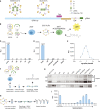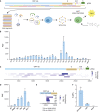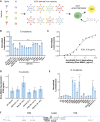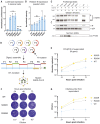Rapid assessment of SARS-CoV-2-evolved variants using virus-like particles
- PMID: 34735219
- PMCID: PMC9005165
- DOI: 10.1126/science.abl6184
Rapid assessment of SARS-CoV-2-evolved variants using virus-like particles
Abstract
Efforts to determine why new severe acute respiratory syndrome coronavirus 2 (SARS-CoV-2) variants demonstrate improved fitness have been limited to analyzing mutations in the spike (S) protein with the use of S-pseudotyped particles. In this study, we show that SARS-CoV-2 virus-like particles (SC2-VLPs) can package and deliver exogenous transcripts, enabling analysis of mutations within all structural proteins and at multiple steps in the viral life cycle. In SC2-VLPs, four nucleocapsid (N) mutations found universally in more-transmissible variants independently increased messenger RNA delivery and expression ~10-fold, and in a reverse genetics model, the serine-202→arginine (S202R) and arginine-203→methionine (R203M) mutations each produced >50 times as much virus. SC2-VLPs provide a platform for rapid testing of viral variants outside of a biosafety level 3 setting and demonstrate N mutations and particle assembly to be mechanisms that could explain the increased spread of variants, including B.1.617.2 (Delta, which contains the R203M mutation).
Figures




Comment in
-
A new tool to probe SARS-CoV-2 variants.Science. 2021 Dec 24;374(6575):1557-1558. doi: 10.1126/science.abn3781. Epub 2021 Dec 23. Science. 2021. PMID: 34941409
References
-
- Xie X., Muruato A., Lokugamage K. G., Narayanan K., Zhang X., Zou J., Liu J., Schindewolf C., Bopp N. E., Aguilar P. V., Plante K. S., Weaver S. C., Makino S., LeDuc J. W., Menachery V. D., Shi P.-Y., An Infectious cDNA Clone of SARS-CoV-2. Cell Host Microbe 27, 841–848.e3 (2020). 10.1016/j.chom.2020.04.004 - DOI - PMC - PubMed
-
- Rihn S. J., Merits A., Bakshi S., Turnbull M. L., Wickenhagen A., Alexander A. J. T., Baillie C., Brennan B., Brown F., Brunker K., Bryden S. R., Burness K. A., Carmichael S., Cole S. J., Cowton V. M., Davies P., Davis C., De Lorenzo G., Donald C. L., Dorward M., Dunlop J. I., Elliott M., Fares M., da Silva Filipe A., Freitas J. R., Furnon W., Gestuveo R. J., Geyer A., Giesel D., Goldfarb D. M., Goodman N., Gunson R., Hastie C. J., Herder V., Hughes J., Johnson C., Johnson N., Kohl A., Kerr K., Leech H., Lello L. S., Li K., Lieber G., Liu X., Lingala R., Loney C., Mair D., McElwee M. J., McFarlane S., Nichols J., Nomikou K., Orr A., Orton R. J., Palmarini M., Parr Y. A., Pinto R. M., Raggett S., Reid E., Robertson D. L., Royle J., Cameron-Ruiz N., Shepherd J. G., Smollett K., Stewart D. G., Stewart M., Sugrue E., Szemiel A. M., Taggart A., Thomson E. C., Tong L., Torrie L. S., Toth R., Varjak M., Wang S., Wilkinson S. G., Wyatt P. G., Zusinaite E., Alessi D. R., Patel A. H., Zaid A., Wilson S. J., Mahalingam S., A plasmid DNA-launched SARS-CoV-2 reverse genetics system and coronavirus toolkit for COVID-19 research. PLOS Biol. 19, e3001091 (2021). 10.1371/journal.pbio.3001091 - DOI - PMC - PubMed
Publication types
MeSH terms
Substances
Supplementary concepts
Grants and funding
LinkOut - more resources
Full Text Sources
Other Literature Sources
Research Materials
Miscellaneous

